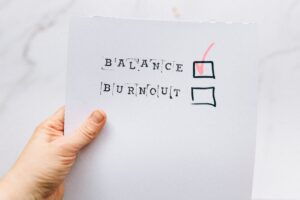 Loss of motivation, feeling drained, skipping work or repeatedly showing up late, harboring a cynical attitude about your day-to-day activities—these are some common symptoms associated with work-related burnout.
Loss of motivation, feeling drained, skipping work or repeatedly showing up late, harboring a cynical attitude about your day-to-day activities—these are some common symptoms associated with work-related burnout.
If your burnout is consistent and debilitating, you might turn to a professional for advice. A therapist can provide you with useful tools to manage burnout. But what if you, the professional, the one giving the advice, are experiencing burnout yourself?
Therapists are expected to be empathetic, forbearing, and experts in self-care, but they are not immune to work-related burnout. If you’re a therapist experiencing burnout, you might find yourself reluctant to address the problem because you are the one expected to have all the solutions.
Symptoms
Your livelihood revolves around caring for others, but it’s important to extend this care to yourself too. Burnout can often be confused with stress, so start by identifying exactly what you are feeling.
- Detachment
- Helplessness
- Loss of motivation
- Feeling empty
Stress, on the other hand, is often characterized by hyperactivity and the feeling of drowning in responsibilities. Burnout and stress can go hand-in-hand, but burnout is more associated with emptiness and fatigue rather than feeling pressured or anxious.
Consequences
You might try to brush off workplace burnout because of the toxic impact of America’s work culture. We’re pressured to feel like burnout is normal, that everyone experiences it and that it’s best to suck it up and keep moving on.
Burnout shouldn’t be brushed off because it can have serious mental and physical consequences. Here are a few:
- Depression
- Irritability
- Exhaustion
- Substance abuse
- Isolation from friends and family
- Neglect of responsibilities
- Increased risk of high blood pressure and heart disease
Causes
 If you’ve identified that you are experiencing burnout, you should try to pinpoint the cause. Work-related burnout can manifest for a number of reasons:
If you’ve identified that you are experiencing burnout, you should try to pinpoint the cause. Work-related burnout can manifest for a number of reasons:
- A poor work-life balance. This can result in working long hours, bringing work home with you (whether physically or emotionally) or neglecting your own interests and hobbies.
- Lack of control. If you have little to no say in your workload or schedule, you might feel a sense of helplessness and defeat.
- Unfair treatment. This can include ill-treatment from coworkers, unfair pay, or favoritism.
- Demanding workload. Although stress differs from burnout, it can be a contributing factor in workplace burnout.
Solutions
 So how do you address your own burnout as a therapist? Here are some preventative measures and tools to use for the treatment of burnout:
So how do you address your own burnout as a therapist? Here are some preventative measures and tools to use for the treatment of burnout:
- Set boundaries. Leave work at work and set a healthy work-life balance. The nature of your work can make this difficult because of emergency calls and the concern you have for your clients off the clock, but let your home be a sanctuary where you can care for yourself.
- Seek a therapist. This might seem like an obvious solution, but plenty of therapists are reluctant to seek help themselves. You probably already recognize all the tools in this article, but it can be difficult to actually apply them. Another therapist can guide you through successful application of the tools you already know.
- Be active. Burnout can cause us to neglect our mental and physical health. The things we once found enjoyable might seem like a chore now. Return to your hobbies, physical activity and friendships, even if the first step might seem daunting or burdensome.
- Take a break. There is no shame in admitting to yourself that you need to take some time off. Use vacation time if you have it. Taking time away from work to rest and recharge is important.
Therapy can be a very fulfilling profession, but it can also take a huge toll on your own mental well-being. Burnout doesn’t always mean that you’ve come to hate what you do for a living, but it is a sign that you should step back from your day-to-day and recognize when it’s time to take a break and start taking healing measures.
If you are ready for a therapist to join you in preventing or healing from burnout, you can find out more about counseling for therapists here. Then contact me today to schedule a complementary 15 minute consultation call today.





